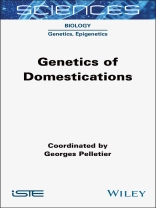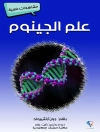The domestication of plants, animals and microorganisms has enabled the development of agriculture, animal husbandry, the processing of their products and, ultimately, civilizations.
The species concerned by domestication, the regions of the world where it could take place, the clues that enable us to identify wild ancestors, the particularly morphological or physiological properties that characterize it, the modified genes, the genetic exchanges that domesticated organisms maintained with their wild ancestors, and the consequences of the structuring of the species that resulted in animal breeds or plant varieties, are all questions that develop studies in the fields of archaeology, sociology, ecology and genetics.
Genetics of Domestications deals with the contribution of modern methods of genetic analysis and genomics to historical knowledge of domestications, their nature and diversity, based on examples of twelve species or groups of species.
İçerik tablosu
Introduction XIII
Michèle TIXIER-BOICHARD and Georges PELLETIER
Chapter 1 Thousands of Years of Relationship between Man and Dog Revealed by Genomics 1
Morgane OLLIVIER
1.1 The history of dog domestication, the subject of much debate 2
1.1.1 The dog: domesticated since the Paleolithic period 2
1.1.2 The process behind dog domestication 3
1.1.3 The number and location of domestication events: contextualization and the contribution of archaeological and genomic data 5
1.2 Paleogenomics: an essential tool for understanding the evolutionary history of the dog 7
1.2.1 Eurasian origins and diffusion 7
1.2.2 The uniqueness of the Iberian Peninsula 8
1.2.3 Origins of the dog in America 9
1.3 From commensalism to modern breeds: identifying the genomic foundations behind the intensification of the human–dog relationship 11
1.3.1 Selection and domestication markers 12
1.3.2 Genetic variation and adaptation to a starch-rich diet 13
1.3.3 The evolution of coat color 14
1.3.4 The question of human–dog co-evolution 15
1.4 Selection of modern breeds, evolution in an anthropic context 16
1.4.1 Origins and timing of selections 16
1.4.2 Phenotypic and genetic variability 17
1.4.3 Harmful effects and genetic diseases 18
1.5 References 19
Chapter 2 Imprints of Domestication in the Sheep Genome 21
Charlotte HER and François POMPANON
2.1 The cradle of domestication in the Middle East 21
2.1.1 The beginnings of domestication 21
2.1.2 Genes involved in domestication 24
2.2 Conquering the West 27
2.2.1 Primitive sheep versus more productive breeds 28
2.2.2 The mouflons of the Mediterranean islands, relics of the first wave of domestication 29
2.2.3 Southern Europe, diversity and global influence 30
2.3 Africa 31
2.3.1 Diffusion 31
2.3.2 North Africa, the impact of the race for productivity 34
2.4 Asia 35
2.4.1 Genetic signatures of origin, expansion and mixes 35
2.5 Conclusion 38
2.6 References 38
Chapter 3 Humans and Pigs: Over Ten Thousand Years of Shared Evolution 41
Laurent FRANTZ
3.1 The evolution of Sus scrofa over the last 2 million years 41
3.2 The genomics of adaptation in Sus scrofa 44
3.3 The processes of pig domestication 46
3.4 Using archaeology and genomics to trace the history of pig domestication 47
3.4.1 Archaeology and history of pig domestication 47
3.4.2 Genomics and the history of pig domestication 49
3.4.3 The first study of mitochondrial DNA 49
3.5 The 19th century and the advent of the out stud-book 52
3.6 Before domestication: human-initiated movements of wild and domesticated pigs 53
3.7 Conclusion 54
3.8 References 54
Chapter 4 The Domestication of the Wild Rabbit: Genetic and Genomic Elements 59
Hervé GARREAU and Cécile CALLOU
4.1 Phylogenetic context of the species 60
4.1.1 Taxonomy 60
4.1.2 Recent genomics tools 62
4.2 Origin and spread of the wild rabbit 63
4.2.1 Hispanic ancestors 63
4.2.2 Crossing the Pyrenees 63
4.3 A recent domestication 64
4.3.1 From leporaria to hutches 64
4.3.2 The molecular marks of domestication 65
4.3.3 Creation of breeds and genes linked to domestication 67
4.4 Back to the wild: an invasive species 70
4.5 Conclusion 72
4.6 References 72
Chapter 5 Domesticated Poultry: A History Illuminated by Genomics 75
Michèle TIXIER-BOICHARD, Xavier ROGNON and Bertrand BED’HOM
5.1 Introduction 75
5.2 Domestic birds and their phylogenetic context 76
5.3 Domestication scenarios 81
5.3.1 The chicken 82
5.3.2 Guinea-fowl 84
5.3.3 Turkey 85
5.3.4 Quail 85
5.3.5 Common duck 86
5.3.6 Pigeon 86
5.4 Genetic mechanisms involved in domestication 87
5.4.1 Setups integrating phenotypic data 87
5.4.2 A priori molecular signature detection 90
5.4.3 Integrating approaches 93
5.5 Conclusion 98
5.6 References 98
Chapter 6 Genetics of Fish Domestication in Aquaculture 101
Fabrice TELETCHEA
6.1 Introduction 101
6.2 Diverse, complex and poorly understood domestication histories 103
6.3 Significant performance improvements for domesticated species 106
6.4 A success story: Atlantic salmon 108
6.5 Conclusion 110
6.6 References 110
Chapter 7 The Domestication of Yeast 113
Jean-Luc LEGRAS, Thibault NIDELET, Virginie GALEOTE and Delphine SICARD
7.1 The history of fermented products and the domestication of microorganisms 113
7.2 Yeast diversity and the evolutionary origins of fermentation 116
7.3 Population structure of yeast isolated from anthropic niches 118
7.3.1 No genetic structure 118
7.3.2 Genetic structure associated with anthropic niches 119
7.4 Genetic basis for the evolutionary history of domesticated populations 120
7.4.1 Hybridization and ploidy 120
7.4.2 Horizontal transfers and introgressions 121
7.4.3 Chromosomal rearrangement 123
7.4.4 Duplication 124
7.4.5 SNP: selection signature a priori 125
7.5 Conclusion 125
7.6 References 127
Chapter 8 The Domestication of Oenococcus oeni: A Bacterium Crafted for Wine Production 131
Jana RUDOLF, Marguerite DOLS-LAFARGUE, Claire LE HENAFF-LE MARREC and Patrick LUCAS
8.1 Introduction 131
8.2 Oenococcus oeni, a wine bacterium for MLF 133
8.2.1 A lactic acid bacterium 133
8.2.2 The wine bacterium 133
8.2.3 The MLF bacterium 134
8.2.4 Description of the species O oeni 134
8.3 Genetic characteristics of O oeni domestication 136
8.3.1 Characteristic traits of domesticated microorganisms 136
8.3.2 Identification of domesticated O oeni genetic lines 137
8.3.3 Genetic mechanisms that contribute to the domestication of O oeni 139
8.3.4 Genetic signatures of domestication 142
8.4 Conclusion 147
8.5 References 149
Chapter 9 Tracing the Origins of Wheat Cultivation 151
Caroline PONT and Jérôme SALSE
9.1 The different types of wheat, one of the most widely consumed cereals in the world 151
9.2 A species with ancient origins resulting from multiple hybridizations 152
9.3 Archaeological evidence of its origins: archaeobotany 154
9.3.1 First traces 154
9.3.2 Domestication center(s) 155
9.3.3 Domestication traits 157
9.4 Genetic evidence of wheat origins: paleogenomics 160
9.4.1 Modern diversity 160
9.4.2 Ancient DNA 162
9.5 Perspectives: studying the origins and spread of wheat cultivation to support the selection of modern varieties 163
9.6 Acknowledgments 165
9.7 References 165
Chapter 10 A History of Cultivated Rice Genomics 169
Philippe CUBRY, Mathias LORIEUX, François SABOT and Alain GHESQUIÈRE
10.1 The history of rice: wild rice and cultivated rice 169
10.1.1 The genus Oryza 169
10.1.2 Characteristics of cultivated rice 172
10.2 The beginnings of genomics and the pan-genomic revolution 173
10.2.1 The first genomic sequence 173
10.2.2 Complementary sequencing and 3, 000 genomes 173
10.2.3 New reference genomes and the appearance of rice pan-genomes 174
10.2.4 Other rice species 175
10.3 Genomics’ contribution to the study of rice domestication 176
10.3.1 Genomics as a tool for studying domestication traits 176
10.3.2 Genomics as a tool for a better understanding of domestication history 178
10.3.3 Domestication of Asian rice 179
10.3.4 Domestication of African rice 180
10.4 Conclusion: the “continuity” of domestication 181
10.5 References 182
Chapter 11 Grapevine Domestication and Selection 185
Patrice THIS, Thierry LACOMBE and Cécile MARCHAL
11.1 Introduction 185
11.2 Vitis vinifera L., the main species of the genus Vitis used for the production of table grapes and wine 186
11.2.1 Vitis vinifera L.: biology and genetic diversity 187
11.3 Origin and domestication of Vitis vinifera L 191
11.3.1 Phylogenetics and biogeography of the genus Vitis 191
11.3.2 Grapevine domestication centers 192
11.4 The main traits that evolved during grapevine domestication 193
11.4.1 Domestication syndrome 193
11.4.2 The presence of male and female organs, a distinctive trait of the wild and cultivated compartments 194
11.4.3 Genetic determinism of flower gender in grapevines 195
11.4.4 Berry color in grapevines: the importance of anthocyanins 196
11.5 From domestication to the present day 198
11.5.1 Ancient grape varieties 198
11.5.2 Relationships between grape varieties 199
11.5.3 Table grapes, wine grapes 200
11.5.4 The phylloxera crisis and its consequences 201
11.6 The grapevine of tomorrow 202
11.7 References 203
Chapter 12 Tomato Domestication and Breeding: A Major Contribution from Wild Species 207
Mathilde CAUSSE
12.1 Introduction 207
12.1.1 Botanical and agronomic description 208
12.1.2 Etymology and systematics 208
12.2 Origin of the cultivated tomato: wild ancestors and centers of domestication 209
12.2.1 Indications provided by botany 211
12.2.2 Archaeological and historical evidence 212
12.2.3 Indications provided by linguistics 212
12.3 The origins of cultivated tomatoes: genetic data 213
12.3.1 Indications provided by genetic diversity 213
12.3.2 Genomics and its contribution 214
12.3.3 Some of the genes responsible for fruit shape diversity 216
12.4 Post-domestication of the tomato after global expansion 219
12.4.1 Introduction and distribution in Europe and worldwide 219
12.4.2 Tomato breeding in modern times 222
12.4.3 Using South American resources for multiple breeding objectives 223
12.5 Conclusion 225
12.6 References 225
Chapter 13 Mutagenesis and Accelerated Domestication 227
Georges PELLETIER
13.1 Random mutagenesis and neo-domestication 228
13.1.1 Random mutagenesis 228
13.1.2 The example of Vigna stipulacea 229
13.2 Genome editing and domestication 229
13.2.1 Genome editing 229
13.2.2 De novo tomato domestication 231
13.2.3 Domestication of Physalis pruinosa 232
13.2.4 Domestication of Oryza alta 234
13.2.5 Other candidate species for accelerated domestication 235
13.3 Limits and constraints of neo-domestication 236
13.3.1 In practical terms 236
13.3.2 In terms of health and environmental safety 237
13.3.3 In legal terms 238
13.3.4 In regulatory terms 238
13.4 Conclusion 239
13.5 References 239
Glossary 243
List of Authors 249
Index 253
Yazar hakkında
Georges Pelletier is Honorary Research Director at the INRAE (Institut national de recherche pour l’agriculture, l’alimentation et l’environnement), France, where he specializes in plant genetics and biotechnology. His research focuses on DNA exchanges between mitochondrial genomes and genome-modification methods, including transgenesis, from both fundamental research and plant breeding applications.












